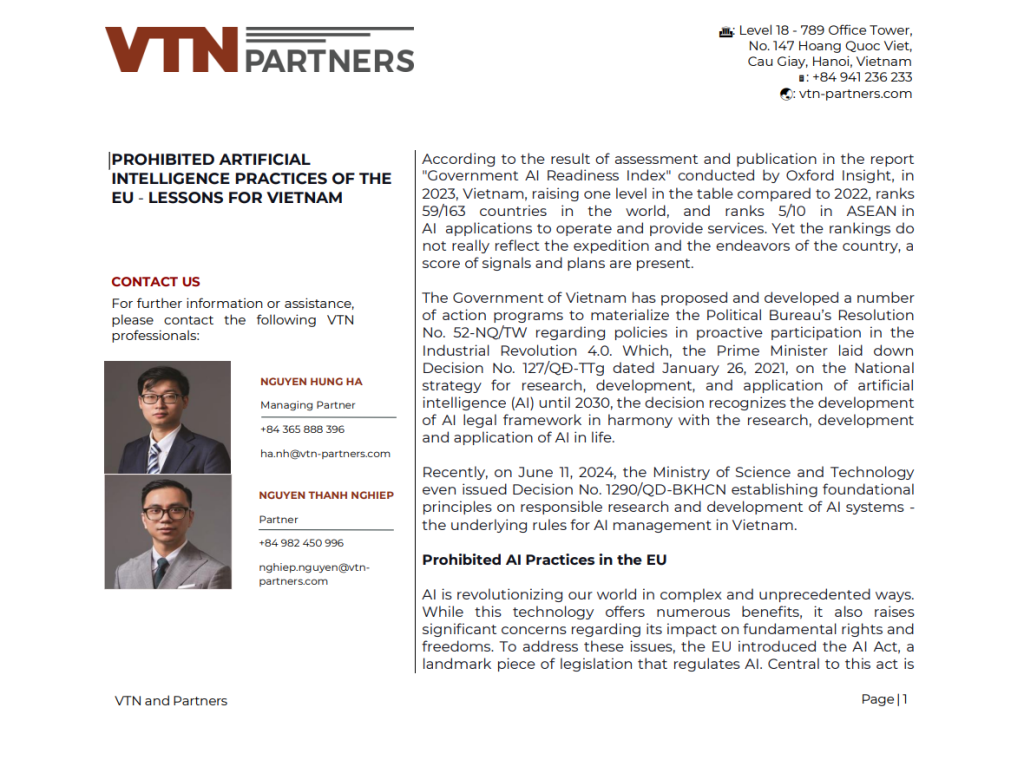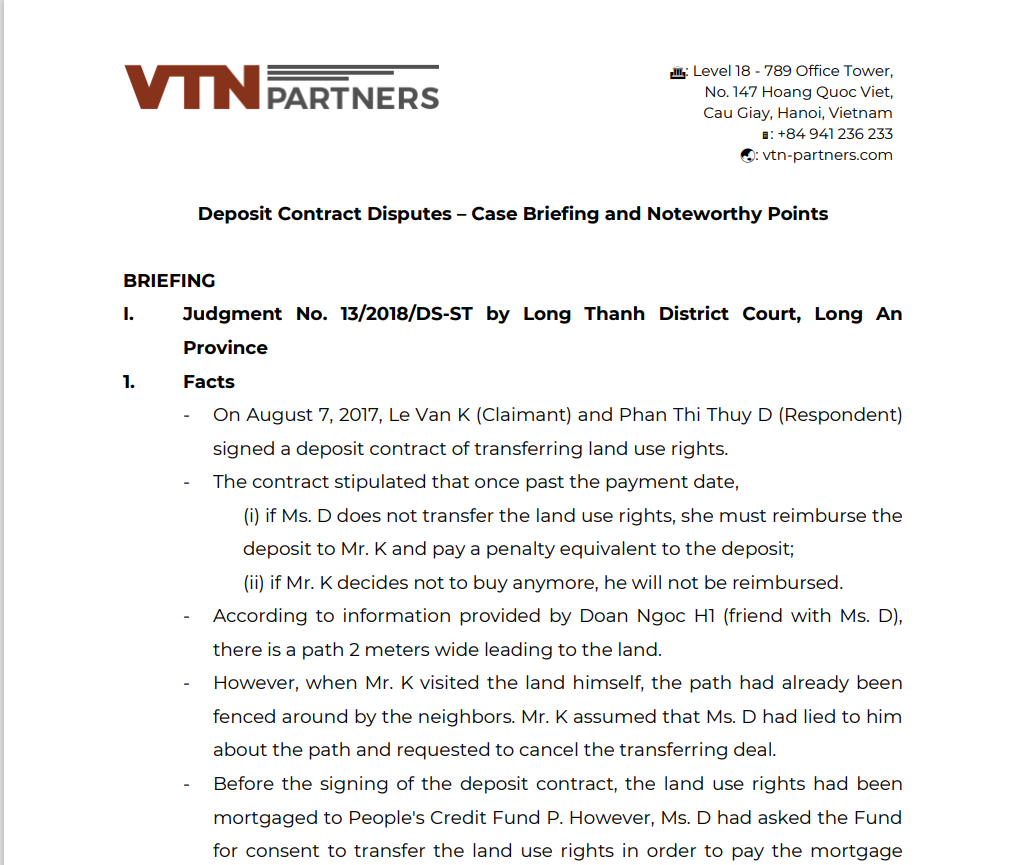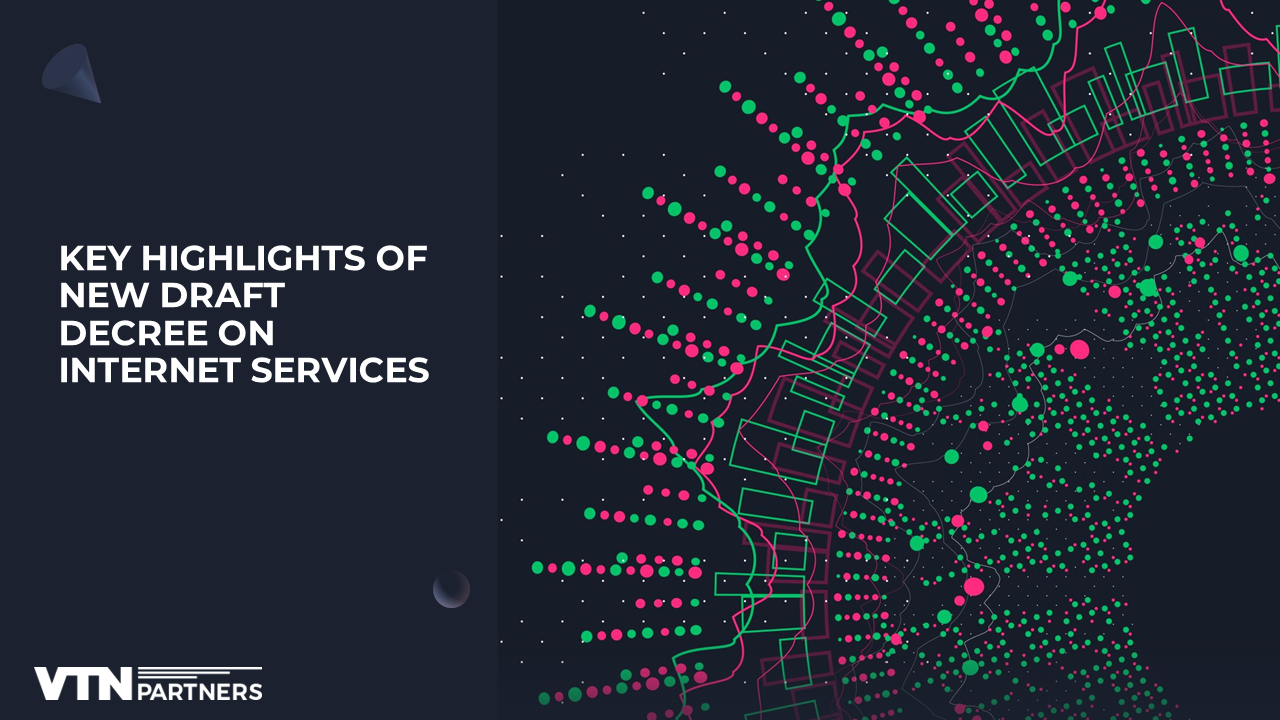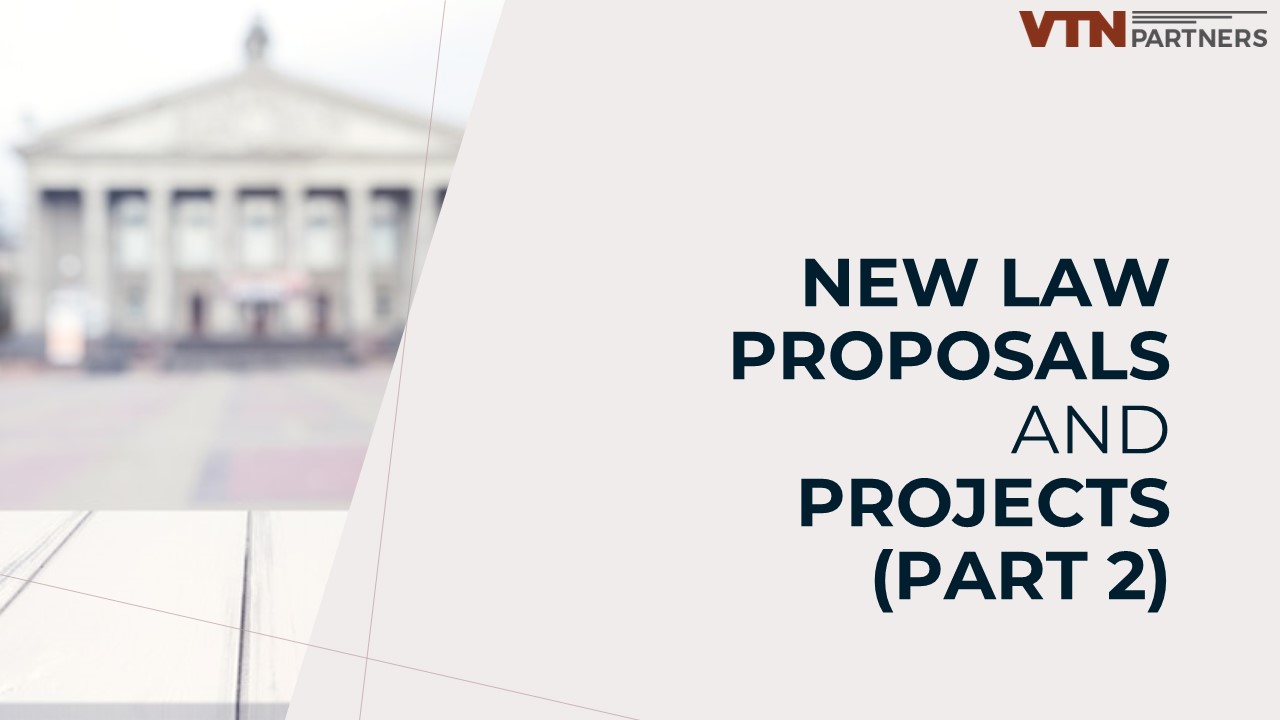According to the result of assessment and publication in the report “Government AI Readiness Index” conducted by Oxford Insight, in 2023, Vietnam, raising one level in the table compared to 2022, ranks 59/163 countries in the world, and ranks 5/10 in ASEAN in AI applications to operate and provide services. Yet the rankings do not really reflect the expedition and the endeavors of the country, a score of signals and plans are present.
The Government of Vietnam has proposed and developed a number of action programs to materialize the Political Bureau’s Resolution No. 52-NQ/TW regarding policies in proactive participation in the Industrial Revolution 4.0. Which, the Prime Minister laid down Decision No. 127/QĐ-TTg dated January 26, 2021, on the National strategy for research, development, and application of artificial intelligence (AI) until 2030, the decision recognizes the development of AI legal framework in harmony with the research, development and application of AI in life.
Recently, on June 11, 2024, the Ministry of Science and Technology even issued Decision No. 1290/QD-BKHCN establishing foundational principles on responsible research and development of AI systems – the underlying rules for AI management in Vietnam.
Prohibited AI Practices in the EU
AI is revolutionizing our world in complex and unprecedented ways. While this technology offers numerous benefits, it also raises significant concerns regarding its impact on fundamental rights and freedoms. To address these issues, the EU introduced the AI Act, a landmark piece of legislation that regulates AI. Central to this act is Article 5, which sets ethical boundaries for AI use and outlines prohibited AI practices in the EU, including:
(a) Deceptive Manipulation: The act bans the employment of deceptive techniques to manipulate individuals’ decisions, leading them to take actions they otherwise would not. The concern here is the potential erosion of personal autonomy and the risk of nudging individuals toward harmful outcomes.
(b) Exploitation of Vulnerabilities: Those exploiting the vulnerabilities of individuals or specific groups due to their disadvantaged situations are completely prohibited. This prohibition is established on an ethical obligation to prevent the exploitation of vulnerable individuals or groups by AI technologies.
(c) Social Scoring and Discrimination: AI systems that evaluate and classify individuals or groups over a period based on social behavior or inferred personal characteristics, resulting in discriminatory treatments through social scoring, are not allowed.
(d) Predictive Risk Assessments: The act prohibits systems that assess or predict the risk of individuals committing criminal offenses solely based on profiling or personality traits. This prohibition does not apply to AI systems used to support human assessments in criminal investigations, provided they are based on objective and verifiable facts directly linked to criminal activity.
(e) Facial Recognition and Database Creation: It stands against the AI systems that create or expand facial recognition databases by the untargeted scraping of facial images from the internet or CCTV footage.
(f) Emotion Inference in Specific Areas: It expressly forbids the systems analyzing individuals’ emotions in workplaces and educational institutions. The AI used for medical or safety purposes is carved out.
(g) Biometric Categorization: Biometric classification systems categorizing individuals based on biometric data to infer attributes such as race, political opinions, trade union membership, religious beliefs, sexual orientation, or sex life are also prohibited. This paragraph does not cover labeling or filtering of lawfully acquired biometric datasets.
(h) Biometric Identification in Public Spaces: AI systems that use real-time remote biometric identification in publicly accessible spaces for law enforcement are contrary to the act, except for (i) targeted searches for victims of abduction, trafficking, or sexual exploitation, and missing persons; (ii) preventing specific, substantial, and imminent threats to life or physical safety, or genuine and foreseeable threats of terrorist attacks; and (iii) locating or identifying suspects in criminal investigations or prosecutions, or executing criminal penalties.
Lessons and Recommendations for Vietnam’s AI Legal Framework:
Vietnam’s progress in AI applications and governance, as highlighted by its ranking in the “Government AI Readiness Index,” underscores the country’s commitment to leveraging AI for societal and economic benefits. However, the development of a comprehensive AI legal framework is crucial to ensure that AI technologies are used ethically and responsibly. The EU’s AI Act serves as a valuable reference point, offering a guiding beacon for establishing global benchmarks in AI regulation.
Balancing Human Rights and AI Development: According to Article 14.2 of the Constitution of Vietnam, human rights and citizens’ rights may only be restricted by law in specific cases of necessity, such as national defense, security, social order, and public welfare. This principle should be central to Vietnam’s AI regulations, ensuring that any restrictions on rights are clearly defined and justified. For instance:
AI systems should be restricted in cases where they pose a significant and imminent threat to the life or safety of individuals or groups.
AI use in criminal investigations should be strictly regulated, allowing access to personal data only under judicial authorization, with provisions for emergency situations.
Prohibition of Discriminatory AI Systems: Vietnam should explicitly prohibit AI systems that cause discrimination, in line with Article 16.1 of the Constitution, which guarantees equal rights for all. This includes both direct discrimination (e.g., based on age, gender, religion) and indirect discrimination (e.g., through social scoring that leads to unfavorable treatment). The framework should mandate transparency and accountability in AI decision-making processes to prevent biases and discriminatory outcomes.
Protection of Privacy and Personal Data: The right to privacy, as protected under Vietnamese law, should be a cornerstone of the AI legal framework. AI systems should not infringe upon individuals’ private lives, personal secrets, or family secrets without explicit consent. This includes:
The collection, storage, use, and dissemination of personal data, including biometric data and personal images, must be subject to strict regulations and oversight, especially following the personal data protection decree.
Clear guidelines should be established for obtaining consent, with provisions for withdrawing consent at any time.
Safeguarding Honor, Dignity, and Prestige: AI systems should be prohibited from actions that violate individuals’ honor, dignity, and prestige, aligning with Vietnam’s cultural and legal principles. The framework should address the ethical implications of AI technologies, preventing misuse that could harm individuals’ reputations or lead to social stigma.
Protection of Vulnerable Groups: Special protections should be in place for disadvantaged groups, such as the elderly, disabled, or economically disadvantaged. AI systems that exploit these vulnerabilities, potentially causing psychological or behavioral harm, should be strictly regulated. This includes ensuring that AI technologies do not manipulate or coerce vulnerable individuals into actions against their interests.
Responsible AI Development and Use: Building on the principles outlined in Decision No. 1290/QD-BKHCN, Vietnam should establish foundational principles for responsible AI research and development. This includes promoting transparency, accountability, and fairness in AI systems, as well as fostering public trust and understanding of AI technologies.
By adopting and adapting international best practices, such as those outlined in the EU’s AI Act, Vietnam can develop a robust and forward-looking AI legal framework. This framework will not only protect fundamental rights and freedoms but also support the ethical and responsible growth of AI technologies in the country.
#AI #Development #Vietnam #Legal #Framework







